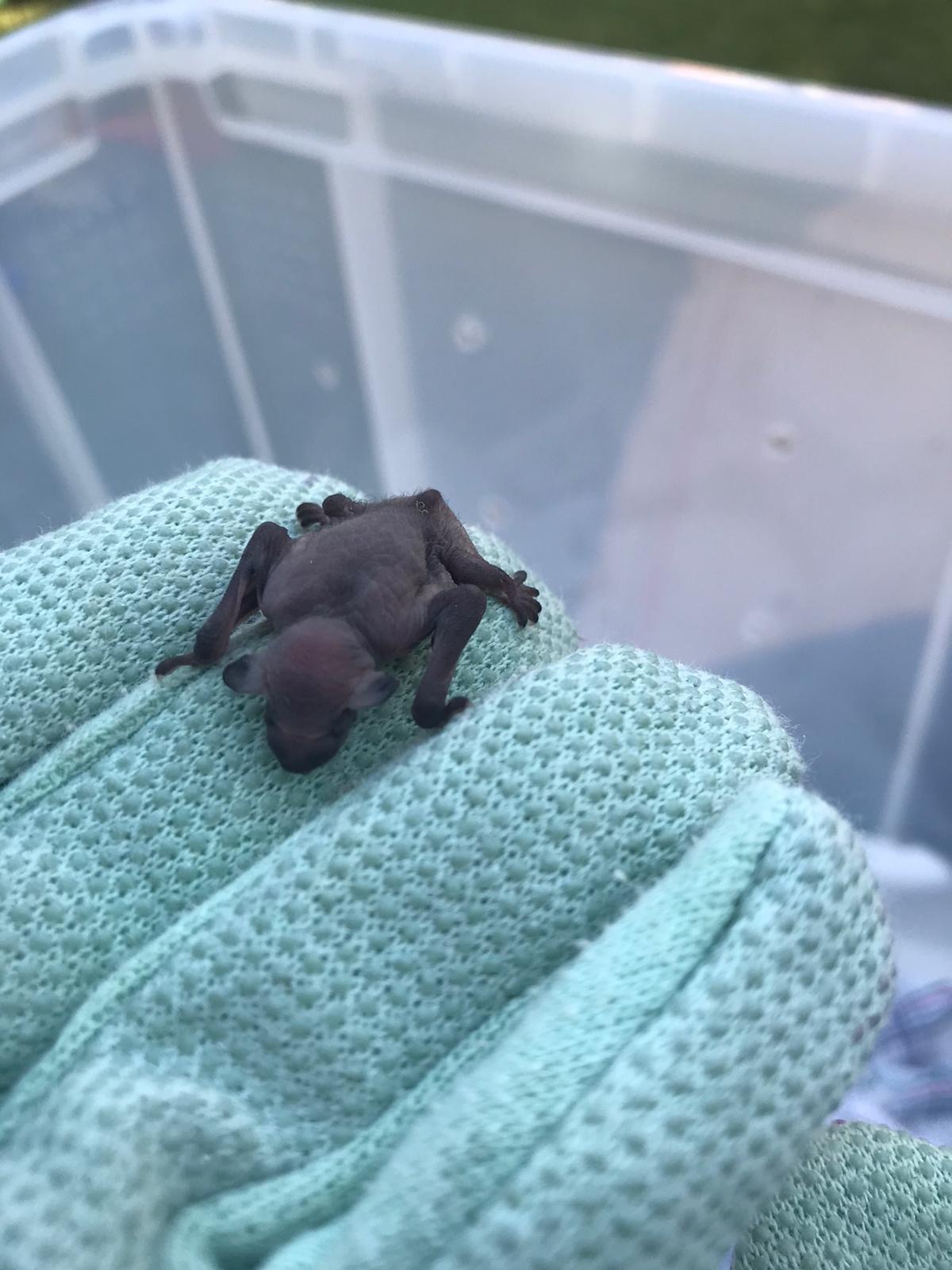1st July 2020

Some of the baby bats found by Tim. (c) Steve Parker
Bat rescuers have been called out to an unusual case of 63 baby bats found in daylight and struggling in the heat wave this week.
On Wednesday alarmed Manchester resident Tim Eaton started finding tiny pipistrelle bat pups falling to the ground from his roof, seemingly due to their loft maternity roost becoming too hot during the day. Many more were still inside the roost, apparently abandoned by their mothers.
He said: “I came home around 1.45pm on Wednesday and found 1 bat outside my back door. That was just the start! After ringing the RSPCA they put me in touch with the Bat Helpline. During the next couple of hours myself and my daughters found 40 plus bats! I contacted South Lancashire Bat Group and with their help we counted 60 plus young bats!
Maisy Inston from the emergency National Bat Helpline said: “When the caller rang there were 16 bats walking around on the ground. Lots more were exposed on the roof. Babies were falling down into the garden. Bats were also falling into the neighbour’s property.
“The caller was calm but wanted to know what to do. We advised him on how to safely contain all the grounded bats in a shoebox, wearing gloves. We put him in touch with bat carers from South Lancashire Bat Group who came to the rescue.”
They included Steve Parker, Colleen Keane and Alexia Fish who gathered the babies, rehydrated them with water and checked their condition.
Steve Parker said: “These were our first babies to arrive this year. Not one - but 63 of them! It was a bit of a shock that there were so many. The pups were all between two days and two weeks old. Each one was about the size of a cherry. Operation ‘Return to Mum’ has been in full flow.”

Pipistrelle baby bat (called a pup) (c) Alexia Fish
Later, when it had cooled down, the rescuers were able to return the infants to the maternity roost, and then they carefully monitored it and were relieved to finally see many of the mothers returning to collect their pups.
Tim added: “We watched the females come back - quite spectacular. Myself and my family got to bed at 2am! Today I have only seen 1 bat. Looking forward to dusk to see if any bats come back.”
No more babies have climbed out of the roost so far. There was also an exhausted female with a heavy baby attached, on the ground, struggling to take off: “It takes mum a lot of effort to move a baby. They can be one third of the adult bat size when they are born and they are fully grown within 5 weeks,” explained Steve.
“It is thought the dramatic rise in temperature probably became critical - that it became too much for the mothers, so they flew off somewhere cooler during the day and left their pups behind. When there is warm weather they will try to move somewhere cooler. I saw this happen two years ago, during another heat wave.”
Dr Orly Razgour, bat researcher and senior lecturer in ecology at the University of Exeter, said: “Under global climate change we expect to see an increase in the frequency and severity of heat waves. Heat waves in Australia over the last few years have resulted in mass mortality of tree roosting bats.

Adult common pipistrelle
“There is not much known about the effects of heat waves on UK bats, but this is exactly the kind of evidence we need to be able to understand and predict impacts of future climate change. What this case shows is that it is not just tree-roosting bats, but also maternity roosts in buildings that are sensitive to the effects of heat waves, and that heat waves can negatively affect the reproductive success of UK bats.”
Maisy paid tribute to all those involved in the baby bat rescue: “This case had a happy ending thanks to the considerate, swift thinking of the home owner and his desire to help bats and the work of our bat team. Our carers and the helpline are on standby in case any further help is needed.”
The National Bat Helpline receives 14,000 enquiries each year from householders with bat roost questions, members of the public who have found injured and grounded bats, plus building trade and planning enquiries. As a result, thousands of bats and their roosts are conserved.
We are only able to do this work thanks to the hard work and dedication of hundreds of volunteers and donations from our charity’s members and supporters, and bat groups around the UK. This includes bat carers who rehabilitate injured bats, roost visitors who help homeowners with bat roosts and volunteers who answer phones on the Out of Hours Helpline in the summer.
The public can support this vital work to help bats by becoming a member. To know more about the Helpline visit this page.
For media enquiries please contact the Bat Conservation Trust on comms@bats.org.uk
Bat Conservation Trust - www.bats.org.uk
BCT are the leading NGO solely devoted to the conservation of bats and the landscapes on which they rely. We work closely with many organisations including over 100 bat groups across the UK. Bats are unique and play a vital role in our environment but during the last century bat populations suffered severe declines. We are working to secure the future of bats in our ever changing world by tackling the threats to bats, from persecution to loss or roosts and changing land use. As the authoritative voice for bat conservation we work locally, nationally, across Europe and internationally.
